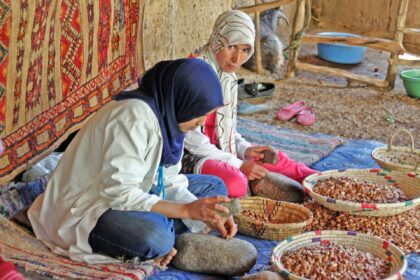The sharing economy is a hot topic topic in travel. According to Skift, while the sharing economy model has been around for awhile, recently the travel sector has really been affected by it.
In a recent article, they state, “Trust in strangers, and a desire to travel like a local rather than a tourist are also on the rise. Sharing and communing with locals is the best part of participating in collaborative consumption.”
Sharing and communing with locals. Isn’t that what travel is all about? Getting to know the people and the place you’re visiting. The sharing economy is all about collaboration and the sharing of resources: cars, homes, meals, tours, gear. Because you’re sharing these resources with a local, you’re becoming more immersed in the culture. Not only that, these resources tend to be cheaper than they would if, say, you ate at a restaurant or booked a night at a hotel.
To help you plan a budget-friendly and culturally-immersive trip, here are 10+ ways the sharing economy is helping travelers have more culturally-immersive experiences.
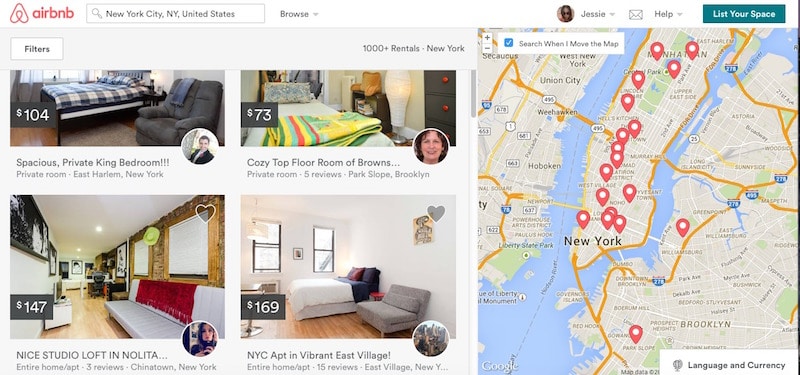
1. Airbnb For Staying With Locals
Airbnb isn’t typically talked about in the sense of being a homestay, and sometimes it’s not; however, you do have the option of staying in an apartment when the owner is there. In fact, I rent out the spare room in my NYC apartment on Airbnb, and love showing my guests — who hail from everywhere from South Korea to Italy to Poland — around the city, hanging out with them on the couch, and sharing stories from our travels and home countries. It ends up being a cultural experience for both my guests and myself.
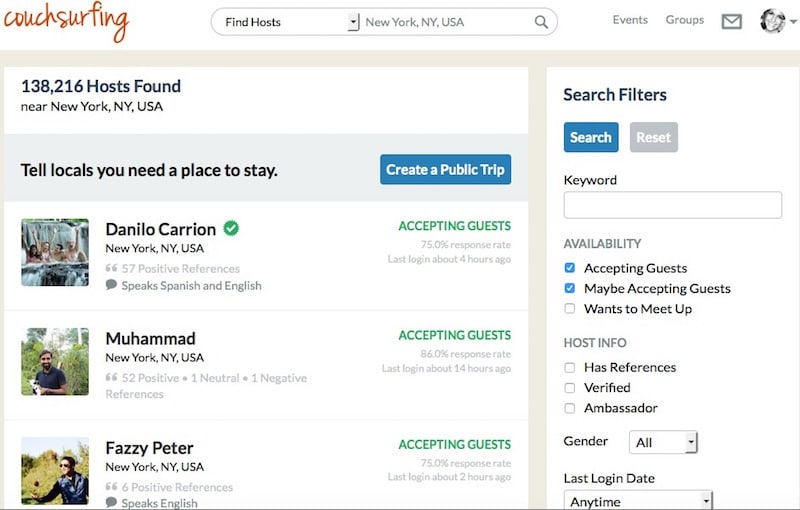
2. Couchsurfing For Staying On Local Couches…For Free
Couchsurfing lets travelers sleep on local couches free of charge, another form of homestay, albeit a bit less comfortable as you don’t have your own bed (although sometimes you do). That being said, it’s a complimentary stay which often makes up for this, depending on your travel style. Aside for the price, what makes Couchsurfing special is it allows you to stay, cook and explore with locals. If you’re really interested in spending a lot of time with your host, I recommend being honest with them beforehand. While most Couchsurfing hosts love getting to know their guests, not all do, so let them know this is what you’re looking for.
Uncomfortable with staying on a stranger’s couch? You can also use the forums in CouchSurfing for attending and planning meetups with locals.

3. WWOOFing For Learning The Art Of Organic Farming
WWOOFing, or World Wide Opportunities on Organic Farms, offers the opportunity for travelers to stay on organic farms all over the world. In exchange for working on the farm, hosts provide guests with free room and board — typically in the form of family-style country fresh meals. You’ll savor local culture through the tongue, as well as by living, working and interacting with locals. What’s also great is that each farm is different; meaning you can work on vineyards in Argentina, creameries in France, harvesting fresh produce in California, or tending to sheep and goats in Australia.
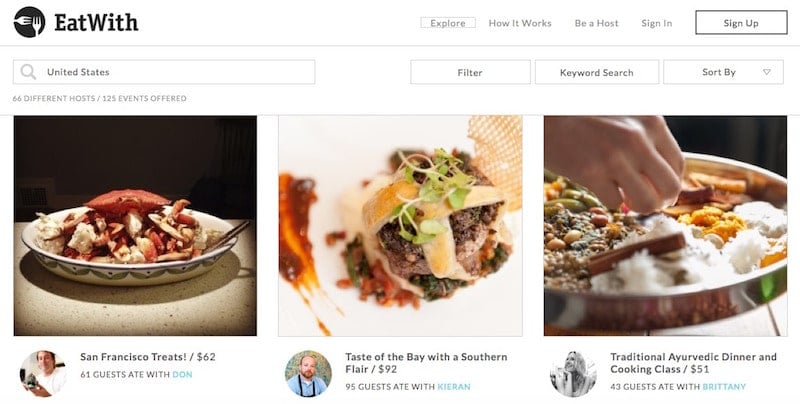
4. EatWith For Local Meals
EatWith is all about local dining experiences. While you’ll get to eat out, you’ll do it in a culturally-immersive way, as you savor dishes in local homes prepared by talented local hobby and professional chefs. Only about 4% of people who apply to be EatWith hosts are accepted, so you know you’ll be getting something delicious. Picture a hedonistic feast with a Bacchanalian yogi in San Francisco, a traditional Shabat dinner with a restaurant-owning couple in Jerusalem, or a homemade park picnic with an organic chef in Buenos Aires. These are just a few of the many local experiences to indulge in with this sharing economy resource.
Another great options for dining with locals are BonAppetour and Feastly.

5. Lyft For Local Rides
Lyft isn’t your average ride sharing app or car service. Like Uber and Sidecar, Lyft is an app where local drivers offer rides to those nearby for an economical price. While Uber is great, what’s extra fun about Lyft is that drivers — who operate their own personal vehicles — are encouraged to bring their personalities to the ride (and riders are made to feel comfortable sitting in the front). They have one particularly interesting initiative called Lyft Creatives, where community drivers provide fun and atypical experiences through themes like Cookie War Lyft, Harry Potter Lyft and DiscoLyft. It’s the type of car service where, often times, the friendship between the driver and the passenger doesn’t end with a ride, as it’s not uncommon for community drivers and passengers to go out for coffee or see a show later on.
Note: While I’ve never used Sidecar personally — they’re not yet in NYC, which is where I typically use car sharing services — I am intrigued by their website. According to their rates, they’re cheaper than Uber and Lyft and allow you to share your ride with other passengers nearby for an even bigger savings.
Want to rent a car from a local to drive yourself? Try Getaround.
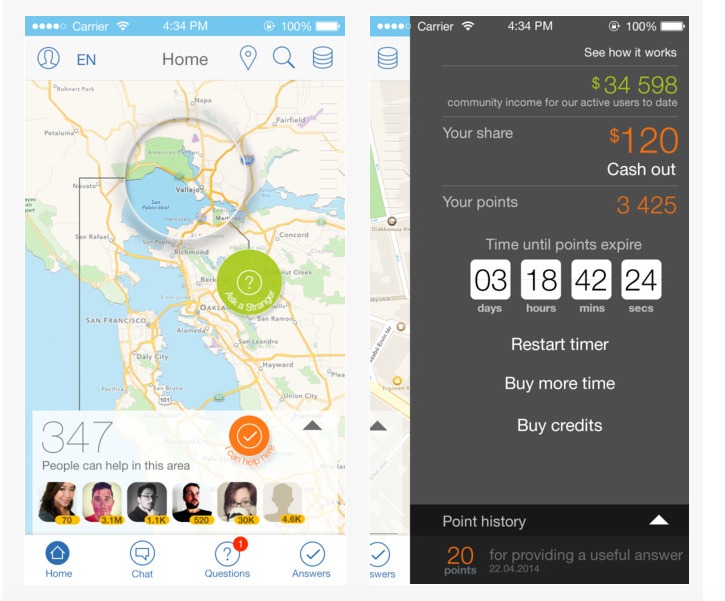
5. Ask A Stranger For Local Knowledge
I first mentioned Ask A Stranger in my article on apps that make travel more social. Travelers can use this brand new app to ask travel questions, that are sent out to knowledgeable locals who earn points incentives to provide answers. More points are awarded to quicker answers that receive positive feedback from askers. The more points collected, the more money earned from the community pot, as askers are charged a small fee to collect credits to put toward questions (50 credits is 99 cents, and you receive 100 free just for signing up). Each question costs 10 credits from the asker. What’s particularly interesting is the private chat feature, which allows travelers to make friends with locals and even meetup to explore together.
Another option is Localfu, a website where you can ask locals absolutely anything for $5. Think where to hike, eat, enjoy a great wine list, see beautiful architecture…really anything. I also love Plansify — mainly because I’m an Advisor on the site (you can see my profile here). The site features travel bloggers, travel experts and industry professionals who list their areas of expertise — and set their own question prices — and you can choose who you’d like to chat with based on their profiles. Text and video Q&A sessions are available.

6. Skillshare For Local Classes
Skillshare offers both online and offline classes with locals in cities around the USA, on topics like Writing, Film, Photography and Culinary. It offers a way to explore a facet of local culture you’re particularly interested in. I love taking classes wherever I go — usually I take at least a cooking and dance class — and find it a great way to explore culture in an active way and spend quality time with locals. A few other sharing economy sites offering local classes include Dabble and CourseHorse (NYC, Los Angeles and Chicago).

7. Tours With Locals For Local Tours
As someone who’s done both excursions by big companies and tours with local guides, my opinion is the big company ones tend to have a more scripted feel. That’s not to say they’re bad, but when you’re looking to immerse yourself in local culture, tours created by and led by locals showing you their favorite places in a destination are usually the better choice. One sharing economy resource I like for this is ToursByLocals, offering everything from cranberry harvesting at a Massachusetts farm to exploring Evita heritage in Buenos Aires to a safari day in South Africa.
I haven’t tried it yet, but I think Withlocals also looks like it has some great tours if you’re going to Asia. The site blends tours, dining experiences and classes. Think bootcamp-style exercise classes in Bangkok parks, having a greasy spoons breakfast in Singapore and cycling in Nepal. Right now the site seems a bit food-centric; however, as it grows I suspect they’ll get more non-culinary experiences. For now, it doesn’t hurt to browse to see if there’s anything you’re interested in.
Other sharing economy sites offering local tours include Adventure.com, Adventure Local and Vayable.

8. Yerdle For Local Goods
When you need gear, goods or apparel, there’s apparently no need to go to a store. Yerdle, a resource I have not tried myself but discovered while researching for this article, allows you to bid on and buy everything from acrylic paint to backpacks with credits. You can earn credits by listing your own goods to rent — plus you get 250 credits just for signing up. Think e-Bay where you pay $0 for your purchase + $3-$4 for shipping. I can definitely picture myself using this app while traveling when I forget extra hiking pants or need a pair of gloves. Great excuse to interact with locals, as well.
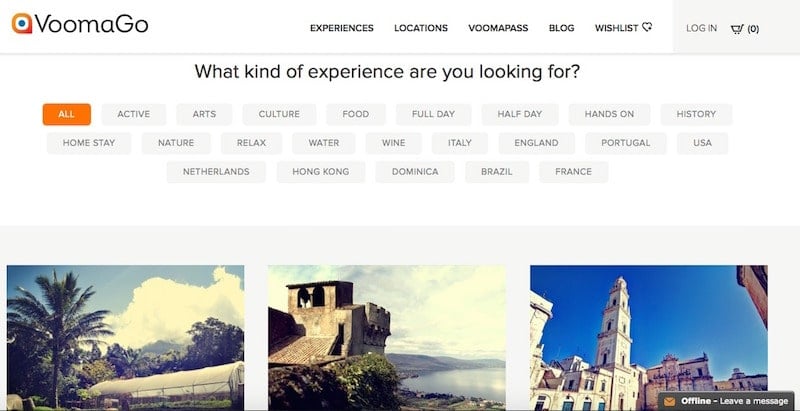
9. VoomaGo For An All-Encompassing Local Experience
VoomaGo is sort of like local travel agent-meets-local tour guide. When you first go to the site you can browse local experiences offered by real locals, listed under the “Experiences” tab. Some that looked interesting to me were the Day With A Local Farmer in Dominica, Sea Urchin Fishing & Snorkeling off the Ionic Coast and Lisbon to Cascais: Gastronomic Delights and Electric Bikes (but, they, I love bikes so much I just got a bike tattoo today on my wrist.)
Their VoomaPass is another interesting feature. You purchase the pass for $299 and then receive all-access travel planning from a local. As someone who worked as a travel agent for a short time — I quit because I felt it was more of a sales job where I was selling packages then actually planning cool trips — I think the chance to have a real local organize your trip is pretty awesome. You’ll also hangout with said local when you arrive and will get a pre-paid phone to stay in contact with them, so you’ll always have on-the-ground support.
10. Doughbies For Local Artisan Baked Goods
Doughbies is a unique sharing economy service for travelers, particularly those who love their pastries. Click “Marketplace” then “Browse the Bakery” to check out delicious locally-made-in-small-batch treats. You can also enter your zip code and let the website know if you’re interested in “pickup” or “delivery” and have tasty treats delivered in less than 20 minutes. What’s also interesting is you can click on each baker to learn their story and even their specialties.
What are your favorite sharing economy apps, websites and tools for immersing yourself in local culture? I’d love to hear in the comments below.
This post was originally published on Jessie on a Journey
Also Check Out:
Notes On Deductive Tasting During An Exam
Caribbean Culture: A Lesson In Cigar Pairing In The Dominican Republic
Jessica Festa
Latest posts by Jessica Festa (see all)
- A Culturally-Immersive Adventure In Mongolia’s Altai Mountains - Jul 8, 2023
- This Recipe Sharing Platform Supports Women In The Culinary Industry (Labneh Recipe Included!) - Nov 5, 2020
- Hiking The Mohare Danda Community Eco-Trek In Nepal - Jun 3, 2020
- 6 Important Questions For Choosing A Responsible Yoga Retreat - May 18, 2020
- How To Create & Grow A Profitable Blogging Business (Ethically) - Jan 18, 2020





